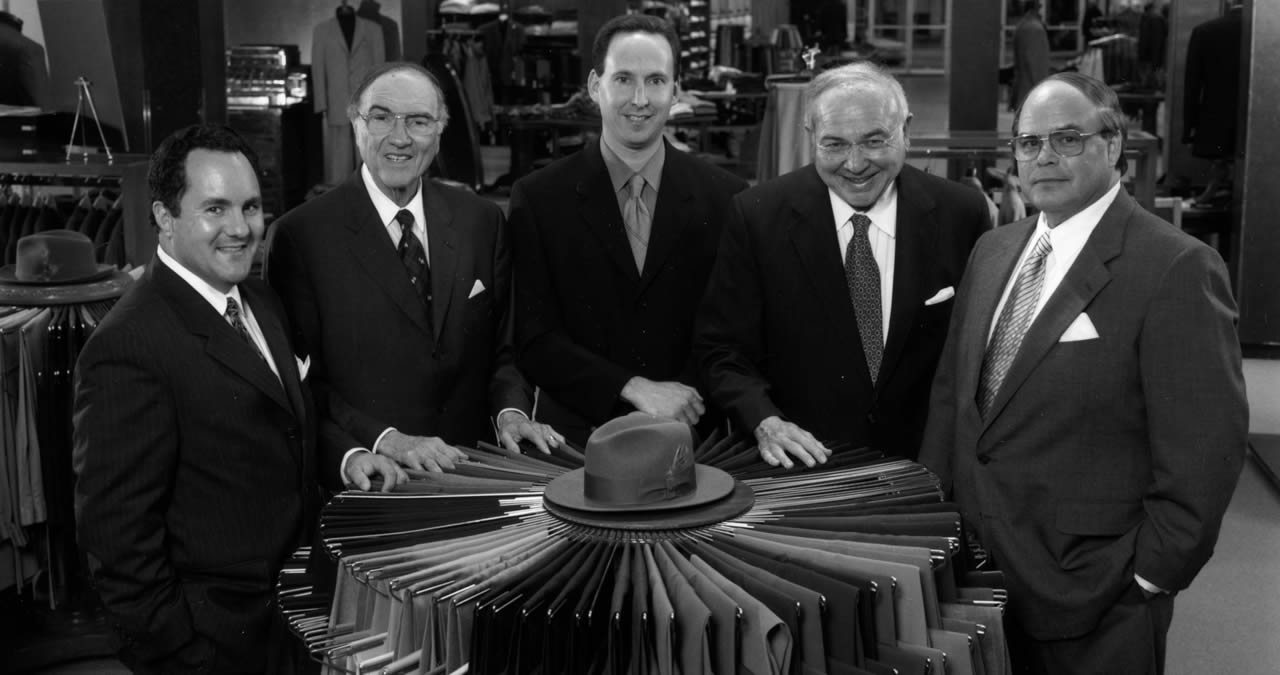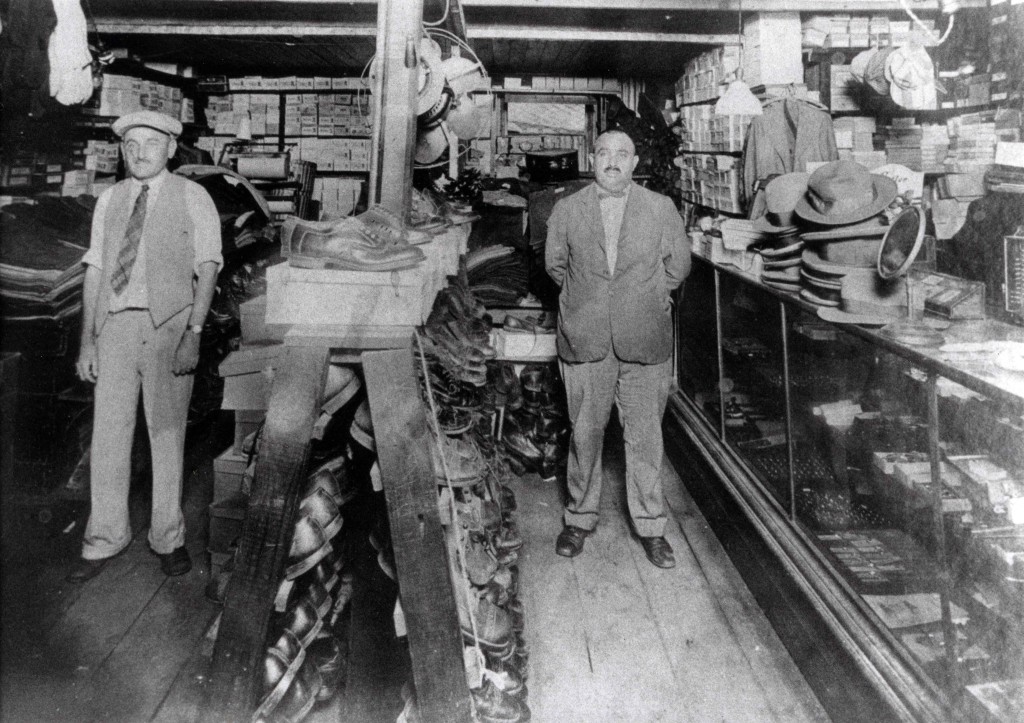


In the first two decades of the 19th century, Columbia’s business district featured several stores carrying general merchandise, including a grocery store run by one of Columbia’s earliest Jewish merchants, Jacob Barrett.[2] Besides groceries, Barrett’s employee Edwin J. Scott recalled selling dry goods—shoes, hats, saddles— and liquors, among other things.[3]
Columbia’s growth benefited from the business skills and commercial connections of Jewish merchants, especially those with ties to Charleston. Humphrey and Frances Marks, who opened an upscale bar named Marks Porter and Relish House, and Levi Pollock and Phineas Solomon, who together ran an auction business, all moved from Charleston to Columbia.[4] Another important early business was operated by the Lyons family, who had come to Charleston from Philadelphia in 1811.[5] Isaac Lyons and his sons, Jacob and Henry, moved to Columbia in the early 1820s and opened a grocery store on the corner of Richardson (Main) and Gervais streets. Their establishment occupied the same location for many years and was well known among the city’s residents, whose support proved crucial in electing Henry Lyons mayor in 1850.[6]
Columbia had become a major commercial hub by the start of the Civil War but suffered significant destruction during the Union occupation. On February 17, 1865, less than two months before the war ended, nearly one-third of the city burned. The fire’s destruction centered in and around Richardson Street (today’s Main Street) and destroyed the heart of the business district.
During Columbia’s recovery, some of the old Jewish businesses were rebuilt and new ones were established on Assembly and Main streets. Philip Epstin, a founder and president of the Tree of Life Congregation from 1899 to 1901, opened D. Epstin’s Clothing Store with his brother David in 1867 on the 1500 block of Main Street. Originally from Poland, the brothers were among a handful of Jewish merchants who helped revive the business district’s vitality. Other such merchants included Henry Steele, who opened a sundry store at 1328 Assembly Street, and Mordecai David, who started several different businesses including grocery and clothing stores.[7]
Beginning in the late 1800s, the number of Jewish businesses grew with the arrival of immigrants from Central and Eastern Europe. Joseph Levy, one such immigrant, worked tirelessly for years as a dry goods merchant in Columbia to sponsor the rest of his family. By 1906 Joseph had saved enough money to book passage from Russia for his wife, Sarah, and his son, Moe, to come to Columbia. Joseph’s work ethic would carry on with Moe, who started a clothing store on the corner of Assembly and Lady streets in 1920. A Columbia staple for nearly a century, Moe Levy’s became an icon for Levi’s jeans and a retail mainstay until 2014.[8]
Similarly, Gabriel Stern, who traveled from Kielce, Poland, to Columbia in 1915, opened a shoe store on Assembly Street in the early 1930s. Initially Stern’s Department Store and ultimately Stern’s Shoes, the business played a valuable role in the Jewish community. According to Gabriel’s daughter Anne Stern Solomon, her father hired many Jewish youngsters from the neighborhood and taught them important business skills, such as how to sell merchandise and interact with customers, skills that would remain with them for the rest of their lives.[9].
The heyday of Columbia’s Jewish merchants came in the mid-20th century with expansion into the suburbs and the development of shopping malls. Arnold Levinson, who learned the clothing business from working in his parent’s dry goods store in Barnwell, opened his own shop, Britton’s, at 1337 Main Street in 1955. Part of Britton’s success, remarked Arnold’s wife, Faye, stemmed from Arnold’s “eye for fashion” and his “love of fabric,” which explains why Britton’s was one of the first Columbia stores to sell Ralph Lauren. Thanks to his fashion sense and willingness to take risks, Arnold’s establishment expanded to include four locations—Dutch Square, Richland Mall, Columbia Mall, and Main Street. Today Britton’s operates one store, run by two of Arnold’s children, Lucky and Stacy.[10]
Though one might inherit a family business, a lot of work is required to maintain its success. Ian Picow, son of Nathan Picow, who opened King’s Jewelers on Main Street in 1945, remarked in a June 2015 interview about the difficulties of retail business. Not only are the hours long and the workweek grueling, but merchants have to invest their entire life in the success of their enterprise,[11] as exemplified by Joe Berry, owner of Berry’s on Main. According to Alan Reyner, the son of Charles Reyner who opened Reyner, Inc. Jewelers on 1604 Main Street in 1919, Joe “was a great merchant” and “could sell just about anything.”[12]
What little is left of the thriving downtown Jewish business community on Assembly and Main streets exists only in the details of the built environment and a handful of surviving businesses. Next time you are in Columbia, pay close attention to the 1600 block of Main Street. You will notice remnants of this bygone era as you pass the former location of Lourie’s at 1601 Main Street, now a Mast General, or the floor tiling of Reyner’s jewelry store at 1604 Main Street. Continue further and you will come across the last remaining Main Street Jewish merchants: Nathan Picow of King’s Jewelers, Roselen Rivkin of Marks Men’s Wear, and Andy Zalkin of Zalkin’s Army and Navy Store. All three fondly remember the close-knit community of merchants on Main Street. Likewise, swing by the 1300 block of Assembly Street and chat with Manny Lifchez at Star Music, Harold Rittenberg of Reliable Loan Office and Pawn Shop, or Jay Friedman of Bonded Loan Office, who, at the slightest provocation, will share their stories of Columbia’s past.